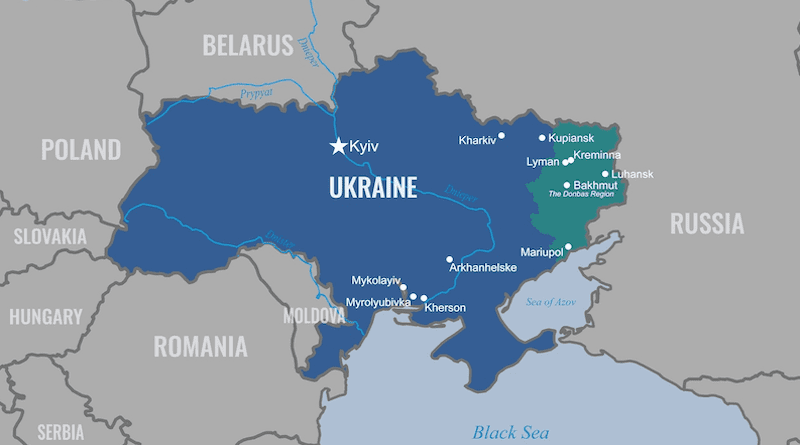Russia Blames Ukraine For Luhansk Attack
By VOA
Russian authorities said Wednesday that Ukrainian shelling in the Luhansk region of eastern Ukraine had killed five people and wounded 19 others, and that Kyiv’s forces had also attacked a Russian town for the third time this week and struck two oil refineries.
The strikes inside Ukraine hit a poultry farm in the village of Karpaty, Russian authorities said. They added that Ukraine had used HIMARS rockets provided by the United States.
Ukraine’s military did not immediately comment on the Russian allegation and rarely publicly takes credit for such attacks.
Russia controls much of Luhansk, one of the areas that Russian President Vladimir Putin claimed to annex last year in a move that the international community rejected.
Russian regional governor Vyacheslav Gladkov said that in the Russian town of Shebekino, 7 kilometers north of the Ukrainian border, two of four wounded people were hospitalized. He said shelling damaged an apartment building, four homes, a school and power lines.
Ukraine’s general staff said its forces had fended off 22 Russian aerial attacks in eastern Ukraine over the past day, and that Ukrainian aircraft had carried out 11 strikes on Russian personnel and military equipment. No location was given.
Russia said, without providing any evidence, it had destroyed Ukraine’s “last warship” during a missile strike on the Black Sea port of Odesa.
Nuclear plant concerns
The head of the International Atomic Energy Agency said the world was “fortunate” that a nuclear accident had not yet happened in Ukraine and issued a set of five principles to help ensure the safety and security of Europe’s largest nuclear power plant, which is located in the country.
“I see these commitments as essential to avoid the danger of a catastrophic incident,” IAEA Director General Rafael Grossi told the U.N. Security Council in a briefing Tuesday about the Zaporizhzhia Nuclear Power Plant, or ZNPP.
The five principles include committing to no attack of any kind against or from the plant; not using it as storage or a base for heavy weapons or military personnel; not putting the plant’s off-site power supply at risk; protecting all structures, systems and components essential to the safe and secure operation of the ZNPP; and not acting in a way that would undermine these principles.
“What we are doing is giving ourselves a better tool to deal with a very bad situation,” the IAEA chief told reporters regarding the five principles.
The Zaporizhzhia plant, which Russia seized in March 2022, has repeatedly been in the crossfire of shelling. It has lost off-site power seven times and had to rely on emergency diesel generators to prevent a nuclear accident. The last such incident was on May 22.
Grossi called on Russia, which occupies the plant, and Ukraine, which owns it, to observe the principles. He also called on council members to “unambiguously” support them. He said the IAEA would immediately start monitoring implementation of these principles through its own team at the ZNPP and “report publicly” on any violations.
Each side has repeatedly accused the other of militarily targeting the plant.
Russia is a permanent member of the U.N. Security Council. Ambassador Vassily Nebenzia said Moscow has taken specific steps to protect the most sensitive installations and components of the ZNPP.
“Russia will take the most severe measures to respond to any attacks by Ukraine against the nuclear power plant, its critical infrastructure, including its power lines, as well as the city of Enerhodar, which is home to the personnel of the power plant and their families,” he told the council.
Ukraine’s envoy said his government has never done anything that could lead to a nuclear incident at the facility, saying Kyiv realizes the “catastrophic consequences” that would have for the country and its neighbors.
“To ultimately remove the nuclear stress stemming from the illegal Russian presence at the plant, the troops and weaponry must be withdrawn, the station must be de-occupied and returned under the legitimate, full control of Ukraine,” Ambassador Sergiy Kyslytsya said.
He also urged the IAEA chief to expand the five principles to include guarantees of an uninterrupted power supply and a humanitarian corridor to ensure the safe rotation of staff at the power plant.
Grossi told reporters he hoped to return to Ukraine “soon” and would also “expect to be visiting Russia” as part of his diplomacy to engage with both sides.
VOA’s Cindy Saine and Margaret Besheer contributed to this report.

